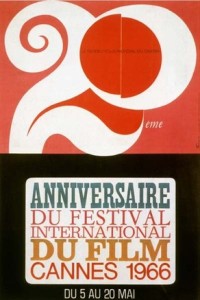 Official poster of the 19th Cannes Film Festival, an original illustration by Rene Ferracci. [1] | |
| Opening film | Modesty Blaise |
|---|---|
| Closing film | Pharaoh |
| Location | Cannes, France |
| Founded | 1946 |
| Awards | Grand Prix : The Birds, the Bees and the Italians A Man and a Woman [2] |
| No. of films | 25 (In Competition) [3] |
| Festival date | 5 May 1966 – 20 May 1966 |
| Website | festival-cannes |
The 19th Cannes Film Festival took place from 5 to 20 May 1966. Italian actress Sophia Loren served as jury president for the main competition.
Contents
- Juries
- Main Competition
- Short Films Competition
- Official selection
- In Competition
- Short Films Competition 2
- Parallel section
- International Critics' Week
- Official Awards
- Main Competition 2
- Short Films Competition 3
- Independent Awards
- FIPRESCI Prize
- Commission Supérieure Technique
- OCIC Award
- References
- Media
- External links
The Grand Prix du Festival International du Film, then the festival's main prize, was jointly awarded to The Birds, the Bees and the Italians by Pietro Germi and A Man and a Woman by Claude Lelouch. [2]
To honour the festival's 20th anniversary, a special prize was given to Chimes at Midnight by Orson Welles. [4]
The festival opened with Modesty Blaise by Joseph Losey, and closed with Pharaoh by Jerzy Kawalerowicz. [5]

